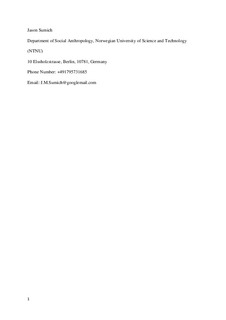| dc.contributor.author | Sumich, Jason | |
| dc.date.accessioned | 2017-09-19T11:49:25Z | |
| dc.date.available | 2017-09-19T11:49:25Z | |
| dc.date.created | 2015-02-05T14:07:53Z | |
| dc.date.issued | 2015 | |
| dc.identifier.issn | 0014-1844 | |
| dc.identifier.uri | http://hdl.handle.net/11250/2455470 | |
| dc.description.abstract | In this essay, I examine the moral basis of a ‘middle class’ in Maputo, Mozambique, the narratives, forms of dependence and types of hegemony that the social hierarchy rests upon. I argue that the political and economic processes that have given rise to ‘new’ middle classes in the global south also create conditions of precariousness. In recent years, it has been argued that these ‘emerging middle classes’ are central for economic growth and the safeguarding of a stable, liberal order. The case of Mozambique complicates this assertion and demonstrates an occurrence now taking place across the globe. When the relationships of dependence and obligation and the narratives that justify them erode, the structures of power that may have once been mutually constitutive between an emerging middle class and the state can become damaging as the system they once upheld loses its legitimacy. | nb_NO |
| dc.language.iso | eng | nb_NO |
| dc.publisher | Taylor & Francis (Routledge) | nb_NO |
| dc.title | The Uncertainty of Prosperity: Dependence and the Politics of Middle-Class Privilege in Maputo | nb_NO |
| dc.type | Journal article | nb_NO |
| dc.type | Peer reviewed | nb_NO |
| dc.description.version | acceptedVersion | nb_NO |
| dc.source.journal | Ethnos | nb_NO |
| dc.identifier.doi | 10.1080/00141844.2014.1002860 | |
| dc.identifier.cristin | 1217618 | |
| dc.relation.project | Norges forskningsråd: 222821 | nb_NO |
| cristin.unitcode | 194,67,45,0 | |
| cristin.unitname | Sosialantropologisk institutt | |
| cristin.ispublished | true | |
| cristin.fulltext | postprint | |
| cristin.qualitycode | 2 | |
